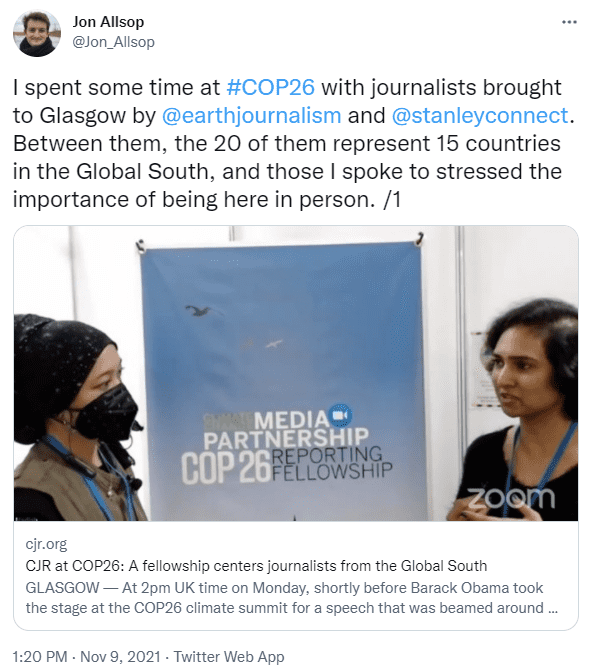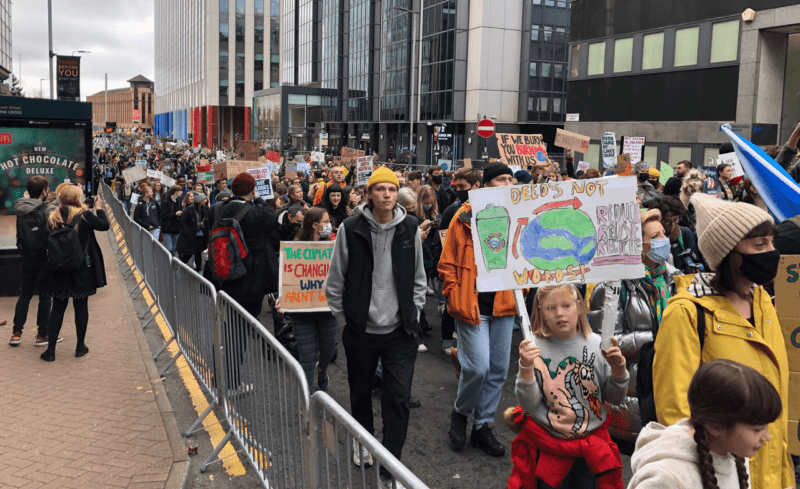Updates from Internews’ Earth Journalism Network
“Everyone should become a climate journalist. Everyone should learn the basics of climate science, because you need to know that just to understand what’s happening and why. And then you can dive into so many different angles.”
EJN’s Executive Director James Fahn on the Media Voices podcast.
As part of the Climate Change Media Partnership (CCMP) program, Internews’ Earth Journalism Network (EJN) in partnership with the Stanley Center for Peace and Security brought 20 Fellows (selected from close to 400 applicants), four trainers, and two Internews Fellows to COP26 in Glasgow from November 4 to 13. CCMP Fellows and Trainers produced more than 100 stories their media outlets, which you can find on the EJN website.
For journalists reporting on the COP from afar, we also provided daily broadcasts between November 8 to 13. In addition, for the first time, CCMP also partnered with Scotland’s largest newspaper, The Scotsman, to publish Fellows’ on-the-ground stories of the impacts and implications of climate change around the world. Don’t miss our 10-minute highlights video – you’ll hear from this year’s CCMP Fellows and Trainers, and get a quick glimpse of all the action on the ground.
In other news, journalists looking to report on their government’s plans for a green recovery to the Covid pandemic should check out our recent webinar and apply for a new story grant. For journalists in East Africa, we’re hosting a panel discussion on One Health. Meanwhile, we’re delighted to close out 2021 on a high note: Four South Asian journalists in our network have won awards! Please join us in congratulating them on the well-deserved recognition of their work. You’ll find these updates and much more in this year-end edition of the EJN newsletter. We’ll be back with more new opportunities and resources in January 2022. Until then, happy holidays to all of you in our global network (14,000+ and counting).
If you received this newsletter from a friend, subscribe here:
Highlights from #COP26: EJN’s Climate Change Media Partnership 2021
Climate Journalism Takes Center Stage at COP26 Side Event, Panel Discussions, Podcasts and More
This year it was more difficult than ever for journalists to attend the COP itself because of Covid-related travel restrictions. But EJN managed to reach the global community through a wide range of events. Through a series of panel discussions and appearances on podcasts before and during COP26, the EJN team emphasized the growing importance of climate journalism and diversity in media. Read more
Live from Glasgow: EJN Daily Broadcasts Analyze Key Priorities of COP26
To support journalists who weren’t able to report directly from COP26, this year’s CCMP added a virtual Daily Broadcast — hosted by Internews’ Malaysia Project Director, Nadiah Rosli — to its usual in-person fellowship program. From November 8 to 13, CCMP hosted these daily broadcasts for half an hour, focusing on different themes each day. Read more
EJN Partners with The Scotsman to Bring Climate Stories from Around the World to Glasgow During COP26
In a first-of-its-kind collaboration, EJN partnered with The Scotsman, Scotland’s largest newspaper, ahead of COP26. The paper published a story from a CCMP Fellow every day for two weeks as negotiations continued, bringing climate news from around the world to roughly five million readers. Read more

Webinars & Panel Discussions
Journalism in the COVID-19 Era: Why Health Reporting Must Focus on Human, Animal and Environmental Issues to Help Combat Future Pandemics
To support journalists’ efforts to better understand these issues and improve their health reporting skills, EJN brings together experts from across Africa to unpack the World Health Organisation’s One Health approach.
Date: December 10 | 4pm Nairobi
Climate Action in 2022: What’s Next for South, Central and Southeast Asia?
The Third Pole, Lights On and Earth Journalism Network have brought climate experts from South, Central and Southeast Asia together to discuss what countries in this region need to do next to honor the commitments they made at COP26.
Date: December 14 | 9am London / 2.30pm New Delhi
Journalism Conference on Reporting Human Rights and Climate Crisis in Southeast Asia
You can also catch members of the EJN team at the Journalism Conference on Reporting Human Rights and Climate Crisis in Southeast Asia, organized by Raoul Wallenberg Institute (RWI), the Indonesian Association for Media Development (PPMN) and Earth Journalism Network (EJN), to hear from EJN’s Senior Asia Program Manager Amy Sim and Joydeep Gupta, South Asia Director of the Third Pole, as they discuss regional challenges on climate change and human rights coverage; South Asia Content Coordinator EJN Ramesh Bhushal in a workshop on regional climate stories; and EJN Special Projects Editor Sam Schramski on the opportunities and challenges in regional collaboration.
Date: December 15 & 16 | Begins 8am Jakarta & Bangkok / 9am Manila & Singapore
And ICYMI, on November 23, EJN organized a webinar for journalists to better understand climate action in the wake of Covid-19. What is the green recovery? Watch the recording to learn more.
Opportunities
As governments pump trillions of dollars into economies devastated by the Covid-19 pandemic, EJN is offering reporting grants to support the production of in-depth stories on the “green recovery”. Journalists should keep a close eye on whether spending within their countries is going towards a sustainable future, or not. Apply by January 10, 2022.
Awards & Recognitions
Jisha Elizabeth, an Indian environmental journalist and an EJN Asia-Pacific 2019 story grantee, was recently honored with an award from the coastal organization My Sea Knowledge for her continued efforts to bring attention to coastal issues. Earlier this year, she was also awarded the Kerala State Biodiversity Board’s Green Reporter Award 2019, in a ceremony much delayed by the pandemic. Her four-part story in Malayalam highlighted the environmental impact of the Vizhinjam International Deepwater Seaport in Kerala. Read the English summary
EJN grantee Monika Mondal won the Thomson Foundation’s first-ever environment prize as part of their Young Journalist Award 2021! She was selected by the judges for “delivering on everything you want from a groundbreaking, fresh and memorable piece of environmental journalism”, in her report on the hidden water crisis behind India’s sugarcane industry for The Third Pole. Read more
Mahima Jain, another EJN grantee, was a runner-up for the Thomson Foundation’s Young Journalist Award 2021. The judges admired Mahima’s ability to “tell deeply moving stories with a detailed and objective style”. Her EJN-supported podcast for Suno India shed light on India’s farm laws and threats to agricultural biodiversity. Listen to the podcast
EJN grantee Athar Parvaiz was recently awarded an Anupam Mishra Medal by the India Rivers Forum for his “exemplary media work on river conservation”. Judges congratulated Athar for “upholding the highest standards of investigation and analysis” while reporting on various issues related to rivers in Jammu & Kashmir. Read some of his stories
Women in Journalism profiled Sapna Gopal, India program associate at EJN. The UK-based network spoke to Sapna about the climate crisis, how it affects women, and developments in the renewable energy sector. Read more
What we’re reading, watching, listening to
Reading: These stories from our friends at Global Voices, an international, multilingual, primarily volunteer community of writers, translators, academics, and human rights activists. It’s heartening to see professional journalists and citizen journalists alike sharpening their focus on climate and environmental issues. Don’t miss this article, on an all-women coral conservation team restoring Indonesia’s Gili reefs.
Watching: Borneo Ocean Diaries, an eight-part series that looks at the impact of overfishing and plastic pollution on the island’s diverse marine ecosystem. This is an original production by Ecoflix, a new not-for-profit subscription-based streaming service with almost 800 hours of “eco-focused content”, available around the world. Users are invited to upload their own content to the platform as well. Although it’s paid (subscriptions are priced at $6.99 per month), all profits go towards supporting the Ecoflix Foundation and their selected conservation NGOs.
Listening to: How the East Africa Crude Oil Pipeline will impact people, vulnerable wildlife habitat and the climate, in this episode of This is Hell, featuring EJN grantee Alex Tumuhimbise and Floodlight News’ founder and editor, Emily Holden. The longform political interview program, which has been broadcast across Chicago on WNUR since 1996, dug into the newly approved East Africa Crude Oil pipeline, which will transport oil 900 miles from the shores of Lake Albert in Uganda to the port of Tanga in Tanzania. Tumuhimbise shared what he learned from his field reporting, where he met with communities affected by the $20bn project. His story, produced by Floodlight News in partnership with Earth Journalism Network, was published in The Guardian last month, just as world leaders gathered in Glasgow to hasten the transition away from fossil fuels.
